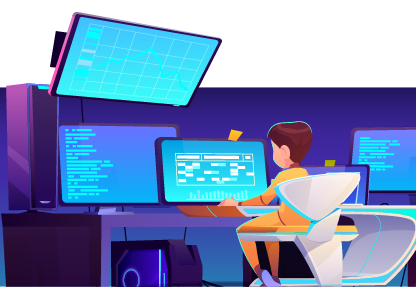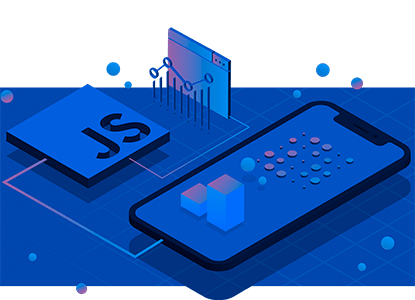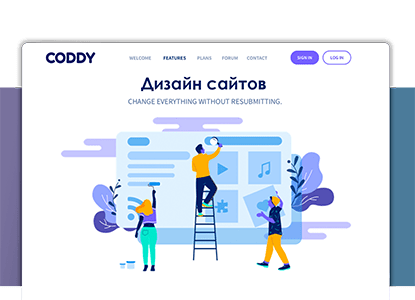Who is a Frontend Developer and What They Do
A frontend developer is an IT specialist who transforms graphic design mockups into functioning web pages. This profession sits at the intersection of design and programming, making the frontend developer a crucial link in creating any website.
An HTML developer uses markup languages and stylesheets to create interactive web interfaces. Without the work of web frontend developers, beautiful design mockups would remain just pictures, unable to function in a browser.
In 2025, the frontend web developer profession becomes especially in-demand. Digitalization encompasses all business sectors, creating constant demand for quality web interfaces.
The role of a website frontend developer extends beyond simple code translation. Modern specialists solve complex problems of performance, accessibility, and user experience optimization.
What Does a Frontend Developer Do: Detailed Overview

The main task is to create an HTML structure and CSS styles based on design layouts.
What does a frontend developer do in daily work? The primary task involves creating HTML structure and CSS styles based on designer mockups.
Frontend development work specifically includes:
- Analyzing design mockups and planning code structure. A layout specialist studies provided design files, determines optimal HTML structure, and plans CSS architecture.
- Creating semantic HTML markup. A frontend specialist writes clean, logical HTML code that properly structures page content for search engines and assistive technologies.
- Writing CSS styles for page styling. Page developers create stylesheets that accurately reproduce visual design in browsers, including typography, color schemes, and element positioning.
- Adapting for various devices and browsers. Modern web developers ensure correct display on mobile devices, tablets, and computers.
- Optimizing performance and accessibility. Frontend developer work includes optimizing page loading speeds and ensuring accessibility for users with disabilities.
- Testing cross-browser compatibility. Website developers check correct display in various browsers and fix emerging inconsistencies.
- Integrating with content management systems. Many frontend developers adapt their code to work with CMS like WordPress or enterprise systems.
"Modern frontend development isn't just translating pictures to code. It's creating fast, accessible, and user-friendly interfaces" — Senior Frontend Developer at *Meta.
*Meta Platforms Inc. is recognized as an extremist organization and is banned in the territory of the Russian Federation.
HTML Developer: Technical Skills and Tools

An HTML developer must master a specific set of technologies and tools for effective work.
Core Technologies for Frontend Developers
- HTML5 forms the foundation of any frontend developer's work. Knowledge of semantic elements, forms, APIs, and new HTML5 capabilities is critically important for creating modern web pages.
- CSS3 and preprocessors enable HTML developers to create complex visual effects. Sass, Less, or Stylus accelerate development and make code more organized.
- JavaScript at a basic level is necessary for modern web frontend developers. Understanding DOM manipulations, events, and core libraries helps create interactive elements.
- Version control systems, especially Git, are used by all frontend specialists for tracking code changes and collaborative team work.
Modern Frontend Developer Tools
- Code editors like Visual Studio Code, Sublime Text, or WebStorm provide comfortable development environments for layout specialists.
- Build systems like Webpack, Vite, or Parcel automate routine page developer tasks: minification, image optimization, preprocessor compilation.
- Design tools like Figma, Adobe Photoshop, or Sketch are necessary for frontend web developers working with mockups and exporting assets.
- Browser developer tools help website developers debug code, analyze performance, and test responsiveness.
- CSS frameworks and libraries like Bootstrap, Tailwind CSS, or Foundation accelerate frontend specialist work and ensure interface consistency.
JavaScript Frameworks and Libraries
- React, Vue.js, and Angular represent the modern ecosystem that frontend developers must understand. These frameworks enable building complex, interactive applications.
- State management libraries like Redux or Vuex help web developers manage application data flow in large projects.
- Testing frameworks ensure code quality and prevent regressions in frontend development work.
Frontend Developer vs Web Designer: Key Differences
Parents often confuse web designer frontend developer roles, though these are different specialties with distinct tasks and skills.
Web Designer: creative component
Web designers create visual website concepts. They work with composition, color, typography, and user experience, creating mockups in graphic editors.
Designers research target audiences, analyze competitors, and develop visual identity. Their work ends with creating detailed mockups of all website pages.
Frontend Developer: technical implementation
A frontend developer takes ready design mockups and transforms them into functional code. They don't create design but implement an already-finished visual concept.
A frontend specialist solves technical challenges: making websites fast, responsive, and accessible. Their work requires code knowledge, not artistic skills.
Full-Stack Designer-Developer: universal specialist

A designer frontend developer combines both skills, making them especially valuable for small projects. Such specialists can independently complete the entire journey from idea to finished website.
However, universality often means less depth of expertise in each area. Large projects prefer role separation between designers and frontend developers.
Criteria | Web Designer | Frontend Developer | Designer-Developer |
Core Skills | Graphic design, UX/UI | HTML, CSS, JavaScript | Design + code |
Tools | Figma, Photoshop, Sketch | VSCode, browser, Git | All above |
Work Output | Mockups and prototypes | Ready web pages | Complete product |
Average Salary | $60-120k/year | $65-130k/year | $70-140k/year |
Working as a Frontend Developer: Salaries and Career Prospects

Frontend developer work offers stable income and excellent growth prospects in the IT industry. The job market demonstrates consistent demand for qualified specialists.
Frontend Developer Salaries in 2025
Entry-level HTML developers in major US cities can expect salaries of $65,000-90,000 annually. Such income is achievable after 6-12 months of learning and creating a basic portfolio.
Experienced web frontend developers with 2-3 years of practice earn $90,000-140,000. At this level, specialists work on complex projects and may lead junior colleagues.
Senior frontend specialists with expertise in modern technologies receive $140,000-200,000. Such professionals often combine frontend work with full-stack development.
Remote work opportunities for layout specialists have expanded significantly. Many companies now hire frontend developers globally, providing opportunities regardless of geographic location.
Freelance work for page developers can be more lucrative but less stable. Experienced freelancers earn $80,000-250,000 annually with high workload.
Career Paths for Frontend Developers
- Full-stack developer represents natural evolution for website developers. Adding backend skills opens higher-paying positions and broader project involvement.
- Technical lead or engineering manager paths suit frontend web developers with leadership qualities. Managing developer teams and making architectural decisions.
- UX/UI designer transition works for designer frontend developers with creative inclinations. Understanding technical constraints makes such designers especially valuable.
- Product manager roles suit frontend developers with business understanding. Technical detail knowledge helps make informed product decisions.
- Entrepreneur in web development - many frontend specialists create their own web agencies or SaaS products.
How to Become a Frontend Development Specialist

The path to frontend developer profession doesn't require higher technical education but needs systematic technology study and constant practice.
Stage 1: Learning HTML and CSS Fundamentals
Beginning HTML developers must master basic web technology concepts. HTML provides document structure while CSS handles visual styling.
HTML study includes understanding semantics, forms, tables, and multimedia elements. Modern frontend developers must know HTML5 and its new capabilities.
CSS requires deeper study: selectors, cascade, specificity, flexbox, grid, animations. Web frontend developers must understand responsive design principles.
Practice on simple projects reinforces theoretical knowledge. Creating static pages helps layout specialists understand profession basics.
Stage 2: Mastering Development Tools
Professional page developers use specialized tools to increase work efficiency.
- Code editors with syntax highlighting, autocomplete, and plugins accelerate code writing. Visual Studio Code has become standard for many website developers.
- Git version control systems are necessary for frontend specialist teamwork. Understanding basic commands and branching principles is critically important.
- CSS preprocessors like Sass or Less help frontend web developers write more organized and maintainable code.
- Project builders automate routine tasks: minification, image optimization, live reload.
Stage 3: Learning Modern Approaches
Modern designer frontend developers must understand component architecture principles and CSS organization methodologies.
- BEM (Block Element Modifier) represents popular CSS class naming methodology used by many frontend developers.
- CSS frameworks like Bootstrap or Tailwind CSS accelerate development and ensure design consistency.
- Responsive design and mobile-first approach became standard for HTML developers in 2025.
- JavaScript fundamentals help web developers create interactive elements and understand modern framework operations.
Stage 4: Creating Portfolio and Job Search
Quality portfolio represents the key to successful frontend developer employment. It must demonstrate skill diversity and code quality.
Including various project types in portfolios shows frontend specialist versatility: landing pages, multi-page sites, e-commerce platforms.
GitHub code hosting demonstrates layout specialist professional development approach and version control system skills.
Professional community activity helps page developers find work and develop professionally.
Frontend Development Training at CODDY School

CODDY programming school offers comprehensive training programs for future frontend developers across various age groups.
Web Development Courses for Children and Teenagers
The "Website Creation" course at CODDY introduces children aged 10-16 to HTML and CSS fundamentals. The program is adapted for schoolchildren and includes creating personal projects.
Students learn web page structure, create responsive layouts, and work with modern frontend developer tools. Practical sessions help reinforce theoretical knowledge.
The Advanced Frontend Development course for teenagers aged 11-14 includes JavaScript study, frameworks, and modern web development approaches.
CODDY Training Advantages
- Experienced practitioner instructors transfer current frontend developer work knowledge. All instructors have commercial development experience.
- Individual approach to each student allows program adaptation to child abilities and interests. CODDY frontend specialists monitor each student's progress.
- Project-based learning provides practical experience creating real websites. Students build portfolios during training.
- Modern technical base and current training programs meet IT market requirements for HTML developers.
- Employment assistance and internships at partner companies help graduates start web frontend developer careers.
Frontend Developer Career Preparation
CODDY programs prepare not just for technical aspects of frontend specialist work but develop soft skills: communication, teamwork, time management.
Students learn UI/UX design principles, making them more versatile designer frontend developers.
Content management system familiarity and SEO basics expand website developer employment opportunities.

Real project participation under mentor guidance provides invaluable frontend web developer experience.
Frequently Asked Questions About the Profession
The frontend developer profession evolves alongside web technology advancement. Understanding trends helps plan children's educational trajectories.
Technology Trends in Frontend Development
- Component approach becomes standard for frontend developers. Developing reusable components instead of unique pages increases efficiency.
- CSS Grid and Flexbox completely replaced outdated layout methods. Modern HTML developers must freely master these technologies.
- Web Components enable web frontend developers to create cross-platform solutions working in any frameworks.
- CSS-in-JS and atomic CSS change styling approaches. Frontend specialists must adapt to new methodologies.
- Progressive Web Applications (PWA) blur boundaries between websites and mobile apps, creating new opportunities for layout specialists.
Changing Frontend Developer Requirements

A modern layout designer is a universal specialist at the intersection of design and front-end development.
- JavaScript knowledge becomes mandatory for page developers. Simple HTML/CSS development is becoming obsolete.
- Accessibility (a11y) principles understanding becomes mandatory requirement for designer frontend developers.
- Design system and component library skills are highly valued by employers.
- Basic server technology understanding helps website developers better integrate with backend developers.
Career Growth Opportunities
Frontend developer work evolution moves toward full-stack development. Specialists mastering JavaScript and frameworks gain access to higher-paying positions.
Full-stack development becomes popular direction for frontend web developers with technical ambitions.
Product ownership and technical leadership represent development options for frontend developers with leadership qualities.
Conclusion: Frontend Developer as Future Profession
Is frontend development suitable for children?

Frontend developer represents an excellent starting IT position for children with logical thinking and attention to detail. The profession doesn't require complex mathematics but needs patience.
Creative children may find interest in designer frontend developer roles combining technical and visual components.
Basic frontend development study can begin at ages 10-12 through simple HTML pages and game projects.
How long does it take to learn the profession?
Basic HTML developer skills can be mastered in 6-12 months of regular study. Junior position employment typically requires 1-1.5 years of learning.
Becoming a professional web frontend developer takes 2-3 years including JavaScript and modern tool study.
Senior frontend specialist development requires 4-5 years of practical experience.
Is higher education needed for frontend developer work?
Frontend developer work doesn't require mandatory higher education. Employers value practical skills and portfolios more than diplomas.
Technical education may help understand algorithms and systems thinking but isn't critical for layout specialists.
Courses and self-education often prove more effective for mastering page developer profession.
Does the profession have future prospects?
The website developer profession transforms but doesn't disappear. Demand shifts toward specialists with broader technical horizons.
No-code platform development won't replace professional frontend developers but will make their work more efficient.
Digital economy growth creates sustainable demand for quality web interfaces and frontend specialists.
Can frontend developers work remotely?
Frontend developer work perfectly suits remote format. Many companies offer fully distributed positions.
Freelancing allows frontend developers to work with clients worldwide and independently manage workload.

Geographic location doesn't limit HTML developer career opportunities with quality internet access.
HTML developers can work in web agencies, IT companies, startups, or as freelancers. The profession provides freedom in work format choice and opportunity to influence millions of users' experiences.
Web frontend developers aren't just "translators" of design to code. Modern specialists solve complex performance, accessibility, and user experience challenges.
For children and teenagers interested in technology, the frontend developer profession can provide excellent IT career starts. Relatively low entry barriers combine with good growth prospects.
Designer frontend developers are especially valuable in the job market, combining technical expertise with design principles understanding.
Frontend specialists who constantly develop and learn new technologies will always find interesting and well-paying work.
CODDY programming school will help your child master the frontend developer profession from scratch and build a successful IT career. Our web development courses provide practical skills and help create first portfolios.







 Back
Back



